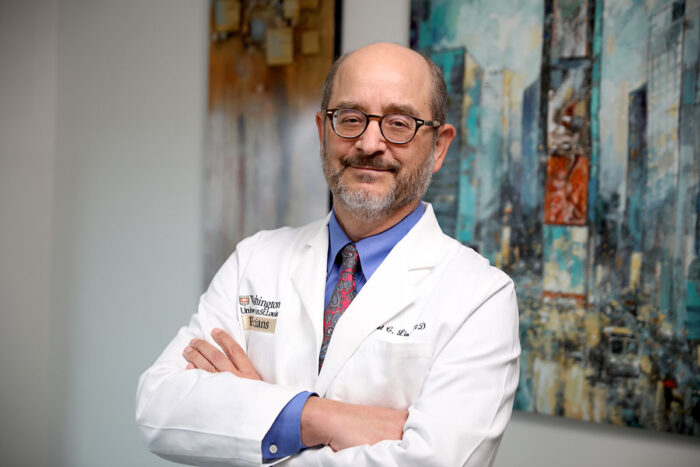Link named oncology division director
Leukemia specialist is leader in research, patient care
 Mike Martin Media
Mike Martin MediaDaniel Link, MD, has been named director of the Division of Oncology at Washington University School of Medicine in St. Louis.
Daniel C. Link, MD, a highly regarded physician-scientist who treats patients with leukemia and also conducts innovative research aimed at developing better treatments for the blood cancer, has been named director of the Division of Oncology in the Department of Medicine at Washington University School of Medicine in St. Louis.
In addition, Link, who also is the Alan A. and Edith L. Wolff Distinguished Professor of Medicine, is deputy director of Siteman Cancer Center, based at Barnes-Jewish Hospital and Washington University School of Medicine.
Link will continue the work of John F. DiPersio, MD, PhD, the Virginia E. and Sam J. Golman Professor of Medicine, who has led the Division of Oncology since 1997 and served as Siteman’s first deputy director. DiPersio, a world-renowned physician-scientist specializing in the treatment of leukemia with immunotherapies and stem cell transplants, is stepping down from these leadership roles to return to full-time patient care and research to improve strategies for stem cell transplantation, treat graft-versus-host disease and develop novel types of CAR-T cell therapies for blood cancers.
“Dr. Link is exceptionally qualified to take on this new role,” said Victoria J. Fraser, MD, the Adolphus Busch Professor of Medicine and head of the Department of Medicine. “He is an outstanding physician-scientist with tremendous leadership skills and was chosen for this position after an extensive national search. He is a national leader in leukemia research and is an exceptional mentor for fellows, postdoctoral scholars and junior faculty, many of whom have gone on to leadership positions in the field. I also want to recognize and extend my sincere gratitude to Dr. DiPersio for his exceptional leadership as the inaugural oncology division director for 25 years and his outstanding contributions as the deputy director of Siteman Cancer Center.”
Link, also a professor of pathology & immunology, is a world leader in understanding hematopoiesis, the process by which different types of blood cells are formed. He has made key advances in the field of stem cell transplantation for the treatment of blood cancers. As the principal investigator of a prestigious Specialized Program of Research Excellence (SPORE) in Leukemia, an estimated $23 million grant, Link leads efforts aimed at boosting translational research and moving promising investigational treatments — developed at Washington University — into clinical trials. Such grants, funded by the National Institutes of Health (NIH), are highly competitive and a cornerstone of the National Cancer Institute’s (NCI’s) efforts to support collaborative, interdisciplinary translational cancer research. Link also has served as co-leader of the Hematopoiesis Development and Malignancy Program at Siteman Cancer Center since 2005.
Over the past 10 years, Link has helped to develop the hematopoietic malignancy program at Washington University into one of the top such programs in the country. Link has served as a mentor to 46 pre- or postdoctoral trainees, many of whom have established independent laboratories at Washington University and elsewhere. His commitment to mentoring and developing the next generation of scientists has been recognized with the university’s Outstanding Faculty Mentor Award and the Distinguished Faculty Award for Graduate Student Teaching. In 2015, he received the School of Medicine Alumni Faculty Achievement Award.
Link earned his bachelor’s degree from the University of Wisconsin-Milwaukee and his medical degree from the University of Wisconsin-Madison. He completed his residency in medicine at what was then Barnes Hospital and a fellowship in hematology-oncology at Washington University School of Medicine. He joined the faculty in 1993 and has remained at the School of Medicine for his entire career.






